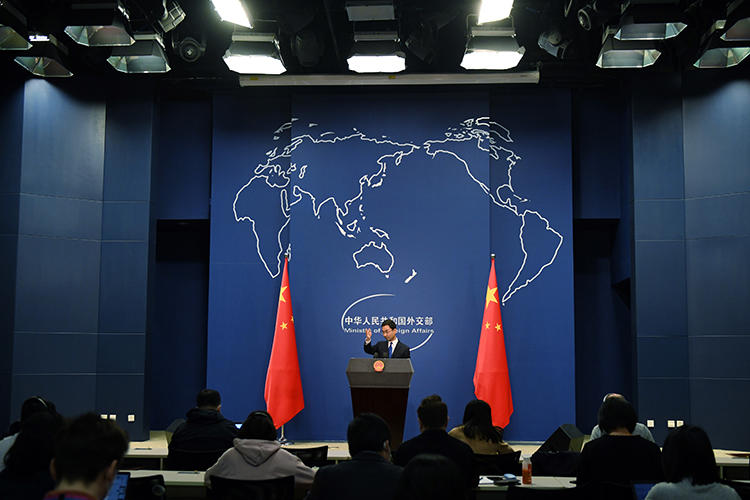Taipei, March 18, 2020 — Chinese authorities should immediately suspend efforts to expel American journalists, cease retaliatory measures against U.S. media operations, and resolve differences with the United States through negotiations rather than attacks on the press, the Committee to Protect Journalists said today.
The Chinese Ministry of Foreign Affairs announced yesterday that all U.S. citizens working as journalists at The New York Times, The Wall Street Journal, and The Washington Post whose press credentials end in 2020 would be required to surrender those credentials within 10 days, effectively forcing them to leave the country. The Foreign Correspondents Club of China, in a statement posted on Facebook, said that at least 13 U.S. correspondents would be affected, depending on how China enforces the decision.
Chinese authorities will also require the three outlets’ China-based branches, along with Time magazine and the U.S. Congress-funded broadcaster Voice of America, to produce written reports concerning their staff, financing, operations, and real estate in the country, according to the announcement.
The Ministry of Foreign Affairs statement said the move was in retaliation for measures taken by the U.S. government earlier in March, which designated five Chinese state media organizations–Xinhua, CGTN, China Radio, China Daily, and The People’s Daily—as foreign missions and imposed a limit of 100 on U.S. visas for Chinese citizens at those outlets, forcing up to 60 to leave the U.S., as CPJ documented at the time.
“China’s expulsion of U.S. journalists may enhance its ability to block investigative reporting into human right abuses in Xinjiang or its earlier mishandling of the coronavirus crisis, but at the terrible expense of accurate, fact-based reports badly needed during a global pandemic,” said Steven Butler, CPJ’s Asia program coordinator, in Washington, D.C. “It is unfortunate that U.S. moves to restrict Chinese media operations gave China the perfect cover to suppress reporting that it has always complained about, under the phony banner of taking ‘reciprocal’ measures.”
The Ministry of Foreign Affairs statement also said that the expelled journalists would not be able to report from the special administrative regions of Hong Kong or Macao. The Foreign Correspondents Club of Hong Kong said in a statement that it was “concerned by reports that they will be banned from working as journalists in Hong Kong, given that Hong Kong has its own system under which press freedom is a right according to the law.”
CPJ issued a report in December documenting the steady erosion of press freedom in Hong Kong.
The Macau Portuguese and English Press Association also issued a statement raising concerns about the decision and its impact on press freedom in the former colony.
On February 18, the U.S. State Department designated the five Chinese media organizations as “foreign missions,” as CPJ documented. The next day, China announced that three Wall Street Journal correspondents would be expelled from the country, allegedly over a racist op-ed headline. On March 2, the U.S. said it would limit visas for Chinese journalists.
After the Ministry of Foreign Affairs issued its notice yesterday, Chinese state media ramped up attacks on the U.S. and its media. The Xinhua news agency published a report citing discrimination against Chinese journalists operating in the United States, and the Global Times daily accused The New York Times of attacking the Chinese political system and smearing China’s efforts to combat the coronavirus.
The Global Times quoted a professor in U.S. studies who accused the five U.S. media outlets of “ideological bias against China, cooking up fake news under the disguise of press freedom and breaches of journalism ethics.”
In a statement, Wall Street Journal editor-in-chief Matt Murray said that the newspaper opposes government interference and that the expulsion is an “unprecedented attack on freedom of the press.”
Dean Baquet, executive editor of The New York Times, released a statement condemning Chinese authorities’ decision, calling it “especially irresponsible at a time when the world needs the free and open flow of credible information about the coronavirus pandemic.”
Martin Baron, the editor of The Washington Post, condemned the action and said “the Chinese government’s decision is particularly regrettable because it comes in the midst of an unprecedented global crisis, when clear and reliable information about the international response to covid-19 is essential.”
China’s Ministry of Foreign Affairs did not reply to an email from CPJ requesting comment.
